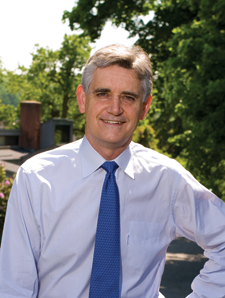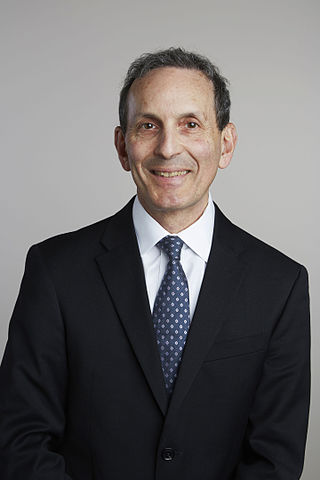Related Research Articles
Phil Gold is a Canadian physician, scientist, and professor.
The Gairdner Foundation is a non-profit organization devoted to the recognition of outstanding achievements in biomedical research worldwide. It was created in 1957 by James Arthur Gairdner to recognize and reward the achievements of medical researchers whose work contributes significantly to improving the quality of human life. Since the first awards were made in 1959, the Gairdner Awards have become Canada's most prestigious medical awards, recognizing and celebrating the research of the world’s best and brightest biomedical researchers. Since 1959, more than 390 Canada Gairdner Awards have been given to scientists from 35 countries; of these recipients, 95 have subsequently gone on to win a Nobel Prize.
William Thornton Mustard was a Canadian physician and cardiac surgeon. In 1949, he was one of the first to perform open-heart surgery using a mechanical heart pump and biological lung on a dog at the Banting Institute. He developed two operations named for him: the "Mustard operation" in orthopedics used to help hip use in people with polio and the "Mustard cardiovascular procedure" used to help correct heart problems in "blue babies," which has saved thousands of children worldwide. He was also the first to treat ALCAPA with a left carotid artery end to end anastamosis in 1953.
Henry George Friesen is a Canadian endocrinologist, a distinguished professor emeritus of the University of Manitoba and the discoverer of human prolactin, a hormone which stimulates lactation in mammary glands.

Ernest Armstrong McCulloch was a University of Toronto cellular biologist, best known for demonstrating – with James Till – the existence of stem cells.
Tak Wah Mak, is a Canadian medical researcher, geneticist, oncologist, and biochemist. He first became widely known for his discovery of the T-cell receptor in 1983 and pioneering work in the genetics of immunology. In 1995, Mak published a landmark paper on the discovery of the function of the immune checkpoint protein CTLA-4, thus opening the path for immunotherapy/checkpoint inhibitors as a means of cancer treatment. Mak is also the founder of Agios Pharmaceuticals, whose lead compound, IDHIFA®, was approved by the FDA for acute myeloid leukemia in August 2017, becoming the first drug specifically targeting cancer metabolism to be used for cancer treatment. He has worked in a variety of areas including biochemistry, immunology, and cancer genetics.
Charles H. Hollenberg was a Canadian physician, educator and researcher.
Victor Ling, is a Canadian researcher in the field of medicine. Ling's research focuses on drug resistance in cancer. He is best known for his discovery of P-glycoprotein, one of the proteins responsible for multidrug resistance.

Jeffrey M. Friedman is a molecular geneticist at New York City's Rockefeller University and an Investigator of the Howard Hughes Medical Institute. His discovery of the hormone leptin and its role in regulating body weight has had a major role in the area of human obesity. Friedman is a physician scientist studying the genetic mechanisms that regulate body weight. His research on various aspects of obesity received national attention in late 1994, when it was announced that he and his colleagues had isolated the mouse ob gene and its human homologue. They subsequently found that injections of the encoded protein, leptin, decreases body weight of mice by reducing food intake and increasing energy expenditure. Current research is aimed at understanding the genetic basis of obesity in human and the mechanisms by which leptin transmits its weight-reducing signal.
Yoshio Masui is a Japanese Canadian cell biologist. Masui retired in 1997 and has since held the position of Professor Emeritus at the University of Toronto.

Shizuo Akira is a professor at the Department of Host Defense, Osaka University, Japan. He has made ground-breaking discoveries in the field of immunology, most significantly in the area of innate host defense mechanisms.
Alan Bernstein is president and CEO of CIFAR. He is recognized as a leader in health research, science policy, mentorship and organizational leadership.

Michael R. Hayden, is a Killam Professor of Medical Genetics at the University of British Columbia, the highest honour UBC can confer on any faculty member. Only four such awards have ever been conferred in the Faculty of Medicine. Dr. Hayden is also Canada Research Chair in Human Genetics and Molecular Medicine. Hayden is best known for his research in Huntington disease (HD).

Bruce William Stillman, AO, FAA, FRS is a biochemist and cancer researcher who has served as the Director of Cold Spring Harbor Laboratory (CSHL) since 1994 and President since 2003. He also served as the Director of its NCI-designated Cancer Center for 25 years from 1992 to 2016. During his leadership, CSHL has been ranked as the No. 1 institution in molecular biology and genetics research by Thomson Reuters. Stillman's research focuses on how chromosomes are duplicated in human cells and in yeast Saccharomyces cerevisiae; the mechanisms that ensure accurate inheritance of genetic material from one generation to the next; and how missteps in this process lead to cancer. For his accomplishments, Stillman has received numerous awards, including the Alfred P. Sloan, Jr. Prize in 2004 and the 2010 Louisa Gross Horwitz Prize, both of which he shared with Thomas J. Kelly of Memorial Sloan-Kettering Cancer Center, as well as the 2019 Canada Gairdner International Award for biomedical research, which he shared with John Diffley.
Allan R. Ronald is a Canadian doctor and microbiologist. He has been instrumental in the investigation into sexually transmitted infections in Africa, particularly in the fields of HIV/AIDS. Ronald is the recipient of multiple awards and honours.
Antoine M. Hakim is a Canadian engineer and physician.
Ronald G. Worton is a Canadian doctor.
Francis Allan Plummer was a Canadian scientist, academic and HIV/AIDS researcher. He was "a recognized specialist in infectious diseases whose work influenced public health policy in Canada and abroad". He was Distinguished Professor Emeritus of Medicine and Medical Microbiology at the University of Manitoba and Scientific Director General, National Microbiology Laboratory.

Daniel Joshua Drucker is a Canadian endocrinologist. A Fellow of the Royal Society, he is a professor of medicine at the Lunenfeld-Tanenbaum Research Institute, Mount Sinai Hospital, Toronto. He is known for his research into intestinal hormones and their use in the treatment of diabetes and other metabolic diseases.

Nicholas John White is a British medical doctor and researcher, specializing in tropical medicine in developing countries. He is known for his work on tropical diseases, especially malaria using artemisinin-based combination therapy.
References
- 1 2 "Gairdner Foundation citation". Archived from the original on 2009-08-03. Retrieved 2008-11-11.
- ↑ "Order of Canada citation".